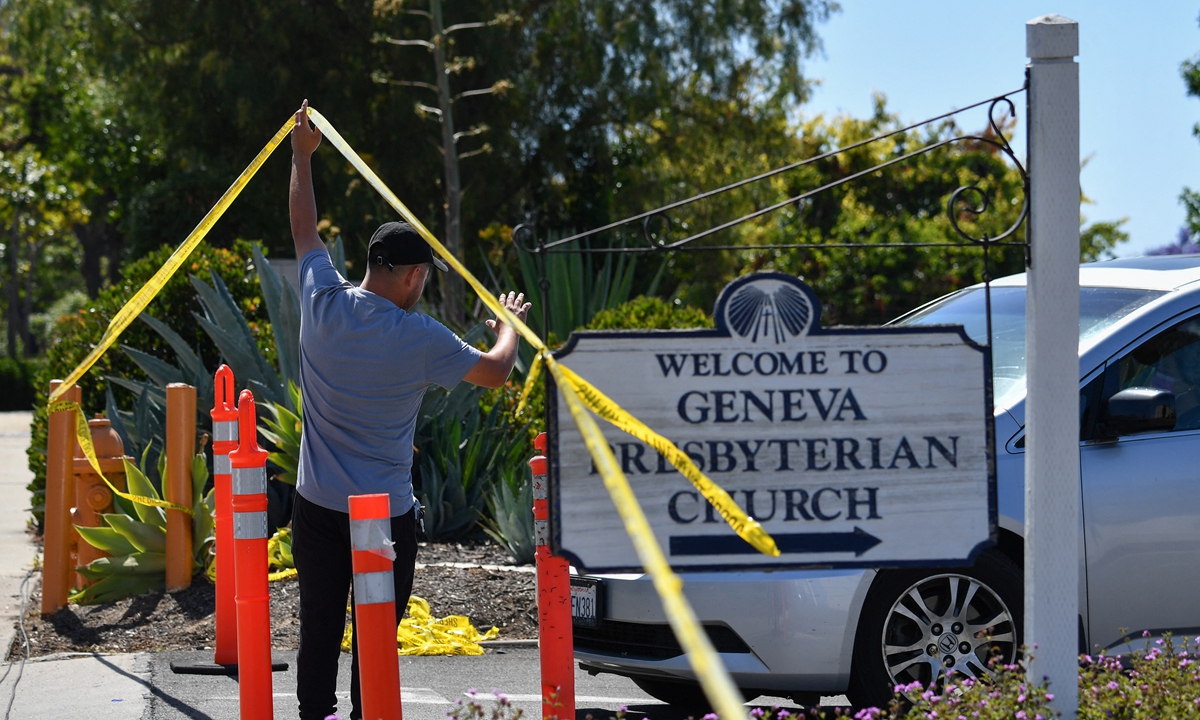
A church staff member raises police tape for a car to exit at the Geneva Presbyterian Church May 16, 2022, after one person was killed and five injured during a shooting the day before at the church in Laguna Woods, California, the US. Photo: AFP
The identity of the suspect behind the California church shooting, who was born in China's Taiwan and immigrated to the US, has become a focal point of West media - they were using it to fan anti-Chinese sentiment and cross-Taiwan Straits tensions. Observers said that US media should instead question why the US soil has constantly bred gun violence.
The suspect, David Chou, 68, a US citizen, killed Dr. John Cheng, 52, and wounded five others during a lunch held at a church in Laguna Woods, California, on Sunday, local authorities said at a Monday news conference.
Orange County Sheriff Don Barnes issued a statement late on Monday saying investigators had determined that the suspect was upset about political tensions involving Chinese mainland and Taiwan, but did not elaborate.
The law enforcement department initially referred Chou as a "Chinese immigrant" with US citizenship.
Yet when reporting on the incident, many US media outlets began to focus on but distort the suspect's identity to frame the attack as a hate crime from a man born in the Chinese mainland against Taiwan communities in the US. The Associated Press said the crime was committed by a "Chinese immigrant motivated by hate for Taiwanese people."
Yet later the authorities confirmed that Chou was born on the island of Taiwan in 1953.
Chinese Foreign Ministry spokesperson Wang Wenbin said at a Tuesday press conference it was noticed that the man was an immigrant to the US from China's Taiwan island, and urged the US to take concrete measures to solve its deteriorating gun violence.
The truth is the crime was committed by a US citizen. So why are the US media so focused on where he lived before moving to the US, instead of asking themselves, why the US soil bred so much gun violence, said a professor from the Institute of International Relations at the China Foreign Affairs University in Beijing.
One day before the church shooting, another
shooting in Buffalo, New York left 10 people dead and three others wounded at a supermarket.
It's politically motivated to pour blame on China. In the US there have been scores of anti-Asian hate crimes motivated by anti-Chinese sentiment espoused by US politicians. But in those scenarios they never admitted their foreign policy is responsible. Yet here, there is an immediate push to frame a Taiwan island shooter to push the anti-Chinese agenda as a whole, Tom Fowdy, a British political and international relations analyst, told the Global Times.
The professor also believes that it is possible that US media is exploiting such an incident to frame the "disadvantage of a community of people with Taiwan heritage" to win over public support for its agenda of playing the "Taiwan card" to contain China.
Some Taiwan secessionists also see this incident as an opportunity to gain merits.
As the suspect is seen connected with the Las Vegas Chinese for Peaceful Unification (LVCNN), a self-organized group that promotes peaceful unification, Lin Ching-yi, a politician from Taiwan's Democratic Progressive Party (DPP), said on Facebook that the incident should remind Taiwan to "look in the face" of the hate speech and organization from the Chinese mainland.
Gu Yawen, head of the organization, said on Tuesday that after talking to Chou a few times, she believes Chou was too extreme, and Chou ceased to participate in activities of LVCNN during the latter half of 2019, and stopped being a member of the organization.
Some Taiwan media, such as Up Media, published articles saying that Chou has links to Chinese mainland authorities.
In response, Zhu Fenglian, spokesperson of the Taiwan Affairs Office of the State Council, said some Taiwan media's political hype of such a tragedy has evil intentions and is inhumane.
"It is a despicable move for some in the DPP to use such a tragedy to attack the Chinese mainland. Their claims are completely baseless," said the professor, who pointed out that it is exactly the DPP's constant political instigation that propagated the hatred against the mainland among some in the island.




